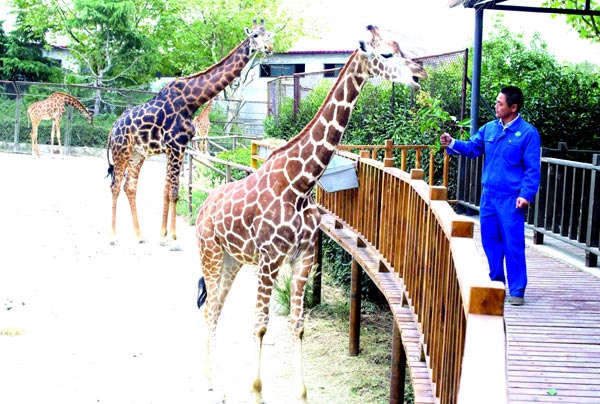 |
|
Animals from Africa have a cosy winter in Shanghai Wild Animal Park. |
But the hot pool is just the wellness center of the 2,200-square-meter hippo "mansion", costing millions of yuan, to "prevent the three youngsters from becoming homesick". The home away from home features familiar grassland and palm tree forests, dotted with rocks resembling granite kopjes.
The custom of a tonic in winter, believed by many Chinese to provide energy to fight a tiger with bare hands, is also given to most of the animals in the wildlife park, including the tiger.
Vegetarians such as rhinoceros, oryx and zebra are fed extra portions of highly nutrient alfalfa to enable them to store more energy. Supplements of vitamins and trace elements are also added to their staple diets.
|
|
Chimpanzees and monkeys are given more in the way of snacks, such as eggs, peanuts and milk, while chefs prepare lamb and beef platters for the carnivores — the lions and leopards.
"They may not necessarily eat more, but they are equipped with more nutrition and energy to get through the hard season," says Ni Li, spokeswoman for the park. Three tons of food is consumed daily by the thousands of animals in the park.
To create an environment that is more in keeping with their wild habitats, keepers at the park have started an environmental enrichment strategy, used by many zoos around the world in recent years to allow animals to "demonstrate their species-typical behavior".
Feeding-enrichment, the most widely used form, helps animals get through the season.
"It's like playing hide and seek," says Zhang Weiping, the keeper of fennec foxes, migrants from the deserts of northern Africa. Zhang has been working for months designing different ways of presenting food, to push the newcomers to investigate, dig, and finally enjoy their tasty discoveries.
Methods developed by Zhang and other keepers at the park include hiding food high in trees for agile climbers, burying it deep in caves for persevering miners, and spreading it around the grounds for careful observers.
"The main purpose is to bring out their natural instincts when looking for food, and, ideally, to get them up doing more exercise in winter, instead of being a couch potato in an air-conditioned room," Zhang says.
But not all creatures find the winter months unbearable. Some with the wherewithal to cope with cold conditions may even revel in a more active lifestyle, such as Siberian tigers, native to areas with temperatures as low as -30 C. Their keeper says the big cats seem to have been enchanted by the rare snow and ice last winter in Shanghai.
Be that as it may, the keepers generally agree that spring is the most joyful season for the animals, wherever they come from. They claim they can tell from the creatures' behavior.
"Spring is the season that nature is revivified and everything comes into itself," one of the keepers says, quoting a Chinese saying.
|
|
|
|
|
|
|
|